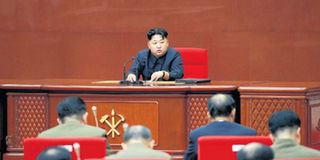Our nuclear weapons secured the agreement, says North Korea’s Kim

This undated picture released by Korean Central News Agency on August 28, 2015 shows Kim Jong-Un in a meeting of the military commission at an undisclosed location. PHOTO | AFP
What you need to know:
- Chairing a meeting of the powerful Central Military Commission, Kim credited the North with striking the deal that ended a tense standoff with the South, Pyongyang’s official KCNA news agency said.
- The agreement, reached after marathon talks in the border village of Panmunjom, pulled both sides back from the brink of an armed conflict and committed them to starting dialogue.
- The CMC, which is the ruling party’s top military policy-making agency, handled the crisis, and the KCNA report suggested that Kim may have ordered a mini purge afterwards.
North Korean leader Kim Jong-Un said nuclear weapons — not negotiating skills — secured this week’s agreement with the South, as he dismissed a number of top military officials.
Chairing a meeting of the powerful Central Military Commission, Kim credited the North with striking the deal that ended a tense standoff with the South, Pyongyang’s official KCNA news agency said.
The agreement, reached after marathon talks in the border village of Panmunjom, pulled both sides back from the brink of an armed conflict and committed them to starting dialogue.
But Kim made it clear that sitting down to talks would not entail North Korea discussing the end of its nuclear weapons plan, which he said was key to maintaining peace.
“The Panmunjom agreement was by no means something achieved on the negotiating table but thanks to the tremendous military muscle with the nuclear deterrent for self-defence”, Kim reportedly told the meeting.
The CMC, which is the ruling party’s top military policy-making agency, handled the crisis, and the KCNA report suggested that Kim may have ordered a mini purge afterwards.
“The meeting dismissed some members of the commission and appointed new ones,” it said, without elaborating.
Since taking power following the death of his father, Kim Jong-Il in December 2011, Kim Jong-Un has repeatedly reshuffled his military leaders.
The latest inter-Korean crisis had its roots in landmine blasts earlier in the month that maimed two South Korean soldiers.
Seoul blamed Pyongyang and responded by switching on giant speakers, which had lain silent for over a decade, and blasting propaganda messages into the North.
North Korea denied involvement and threatened to attack the propaganda units as tensions soared.
The agreement reached in Panmunjom saw the North express regret — but not admit responsibility — for the maiming of the soldiers, while the South ended the broadcasts.
The talks were initiated by North Korea — something analysts took as Pyongyang blinking first in an escalating showdown that included a rare artillery exchange.
In his speech, Kim acknowledged that Pyongyang had sought the negotiations as evidence of its moral and strategic strength.
Meanwhile, South Korean and US troops staged their biggest-ever joint live-fire drill, including a simulated mechanised assault deep into North Korean territory, days after the two Koreas ended a military standoff.
The exercise, conducted in several stages, envisaged an initial North Korean provocation, followed by an escalating clash and culminating in a counter-attack across the border.
The drill was held near the border town of Pocheon, about 20 kilometres south of the demilitarised zone.
“In terms of ammunition and personnel mobilised, this is the biggest live-fire exercise South Korean troops have ever staged independently or jointly with US troops,” a defence ministry spokesman said.
It involved 3,000 soldiers, around 100 tanks and armoured vehicles, 120 heavy guns, 45 helicopters and more than 40 jet fighters.
It followed a recent surge in tensions that had pushed both Koreas to the brink of an armed conflict, before a negotiated deal to de-escalate was reached on Tuesday.
The drill was played out in front of 2,000 guests including President Park Geun-Hye.





